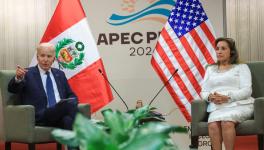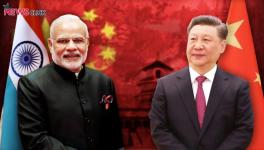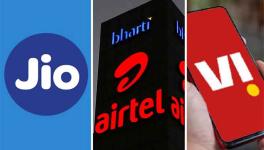Modi's Silicon Valley Visit: Inviting Digital Colonialism for Media Hype
Modi recently had one of his now trademark sound and light shows in the SAP Centre in Los Angeles, while visiting Silicon Valley, the home of high-tech IT industry in the US. He coupled this with meeting the CEO's of companies such as Google, Microsoft, Tesla and a “town hall” with Mark Zuckerberg, the founder-head of Facebook. It was a huge “success” for Modi, the Indian media keeping Modi on its front page for days. Facebook again plugged its discredited internet,org model and created a campaign to support “Digital India”, Google “promised” to provide free wifi in 500 Indian railway stations, and Microsoft talked about connecting India's villages. What was missed in all this media spectacle, is that Facebook, Google, and Microsoft are all interested in grabbing India's digital market, and Modi's high profile visit, has put a public seal of approval on their attempts to takeover this market.
Remember when the British came to India, all the Indian nawabs and rajas were very excited. They all thought that had got now another readymade source of cash. The British traders – East India Company -- competed with the local money bags to “lend” them money for their luxurious, and decadent lifestyles. They probably thought they would never have to pay back the loans to the Company. They did, many with their lives, and lost India to the British.
The British built their empire -- in which they claimed the sun never set – because of their ability to control the oceans. Whoever controls the digital oceans today, will control the world. This is what Modi is gifting away to the US multinationals such as Google, Facebook, and Microsoft, all for a few hours of glory in the Indian media.
This is not all. We also know from the Snowden revelations that Facebook, Google, Microsoft have been fully a part of the NSA and the Five-Eyes (US, UK, Canada, Australia, New Zealand) global spying network. All these companies, along with telecom MNC's such as AT&T and Verizon, act as agents of the US intelligence agencies. They provide access to all their data, to be searched, sorted, and stored in data banks for the next 50 years, by the National Security Agency (NSA) of the US, the shadowy agency that Snowden outed. So giving the US MNC's our data, is not only giving them a very important economic resource, it is also helping the US to monitor intimately all the current and future decision makers in the country.

Image Courtesy: pixabay.com
The India has taken a position on various international fora that internet is a public utility. We are already spending more than Rs. 70,000 crore the National Optical Fibre Network for developing an internet backbone for the country. This is on top of the existing infrastructure that BSNL, and others have already built. It appears that Google will use RailTel – a fibre optic network that Indian Railways has built -- for its wifi installations in the railway stations, giving it access to this very large, existing fibre optic infrastructure, for its own use as well. What Facebook, Google, Microsoft are offering, is the last mile connectivity, the bridge, through which people connect to the internet from their mobiles or computers. While the bulk of the expenditure in providing the internet backbone will be done by the government, Google, Facebook and Microsoft will free-ride on India's public internet infrastructure, for providing this last mile connectivity. This will give them the pole position to access, use and sell our personal data, all in the name of giving us “free” services.
Contrast this with China, who have kept Google, Facebook and others out of their market. The only three companies among the top 10 global IT companies that are not from the US, are Chinese -- Baidu, the Chinese search engine, Ten cents and Ali Baba. China has done this by protecting their huge internal digital market, creating internet and mobile based businesses that rival, if not are more advanced, than their US counterparts. They are now expanding globally, particularly in those markets that, like China, are much more based on mobile based access to the internet.
One of Modi's visits in his tour of Silicon Valley, was to Facebooks' headquarters, where he held an internet based town hall with Zuckerberg. By doing so, he also implicitly gave his seal of approval to Facebook, which reciprocated by allowing people to endorse Digital India on Facebook and change the colour of their Facebook page. Apart from using code lifted out of their campaign for internet.org, what will be the impact of such public bon homie between Modi and Zuckerberg, when telecom officials examine Zuckerberg's proposals of providing a truncated internet supervised by Facebook? Is the Indian PM, by such high profile visit, not vitiating the regulatory process, when Facebook's internet.org is being examined by TRAI, Department of Telecom and Competition Commission of India for possibly violating India's telecom rules?
Zuckerberg claims that he wants to connect the poor to the internet to lift them out of poverty. What Facebook's internet.org is proposing, is that out of the nearly 1 billion websites in the world, the poor need to see only a few; and Facebook will decide what the poor should see: it will be the gatekeeper of the internet for the poor. For providing this service, they should be allowed to violate net neutrality. This is the internet.org platform, now renamed as freebasics.org.
What is more dangerous, is Facebook's suggestion that its platform should also be the vehicle for providing all government services. In other words, e-governance would be through Facebook. If we want to use such government services, we will have to register in Facebook, give Facebook access to our personal data and puts its special surveillance software on our machines. India will henceforth become a province of the Republic of Facebook.
Facebook's business model is selling its users' personal data to the advertisers; therefore more data it gets, higher its revenue. It currently generates $12.76 as revenue per each user, and this is expected to rise to $17.50 by 2017. Having exhausted the global north in terms of users, Facebook is now turning to the global south, which will provide the next set of internet users.
Facebook needs access to all our data, as that is the key currency of its business. Every website or service being hosted on Facebook's platform, will have to share its users' data with Facebook, so Facebook can sell this to its advertisers. Facebook will completely dominate advertising on such a platform, as it will have access to the all the users' data on such a platform, and a far more detailed view of the users. All others who will be on this Facebook platform, will get only small crumbs, as advertising revenue.
Facebook's service model for all internet communications also means its users have very little security, Facebook needs to know what we are doing in order to mine our data. Therefore, it bypasses all security measures, such as encrypting our passwords to our bank accounts. This encryption is a must for any secure transmission of data for commercial transactions that we increasingly perform on the internet. Facebook's platform will not allow such secure transactions directly with the banks and other payment gateways. It will act as the platform on which such transactions will have to take place, and must therefore be in the middle of every transaction. This creates the possibility of a “man in the middle attack” a well known loophole for criminals to use, and act as a single point vulnerability for the entire financial system.
By offering railway stations to Google, villages to Microsoft and India's poor to Facebook, in lieu of public endorsements from their CEO's, Modi is helping their business of commodifying users' data. Giving such US MNC's privileged access to our personal data also means allowing all this data to be freely accessed used by the US intelligence agencies. All this for vain glory of a PM, who seems to be far more interested in basking in the media sun than running the country. As commodification of personal data is what drives the digital economy, this is a sure recipe for creating digital colonialism.
Disclaimer: The views expressed here are the author's personal views, and do not necessarily represent the views of Newsclick
Get the latest reports & analysis with people's perspective on Protests, movements & deep analytical videos, discussions of the current affairs in your Telegram app. Subscribe to NewsClick's Telegram channel & get Real-Time updates on stories, as they get published on our website.
























